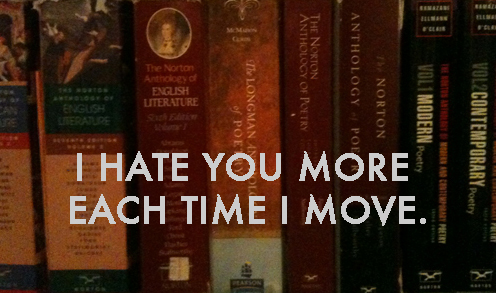
Image Credit:
Julia Delacroix
The bottom shelf of my bookcase is dedicated almost entirely to anthologies. I’ve lugged them around with me for almost 15 years, through four cities and nine houses, and every time I move I think about tossing them. Like the set of Collier’s encyclopedias I ditched in 2001 or the Field Guides I donated in 2009, the anthologies may have outlived their usefulness.
Yes, I might have to hit up the library if I wanted to reread that excerpt from “A Key to the Language of America,” but when would I need just an excerpt these days anyway? And when it comes to teaching poetry surveys, most of the poems I’d want to teach are already online. I’ll almost certainly keep my Nortons because I’m sentimental and I’ve kept them this long and I haven’t yet mastered the concept of “sunk costs.” But I assume that my students all sell back their anthologies, and if I were an undergrad I’m pretty sure I’d do the same.
This semester I’m teaching Introduction to Rhetoric and Writing, and with my students I’m reading Eli Pariser’s The Filter Bubble. One of the more interesting arguments we discussed last week was the idea that the Internet has unbound the news, that most readers now get their news from articles that have been completely removed from their original context. My students and I discussed the ramifications of such decontextualization as it applies to news and civic engagement, but I’ve been wondering how it might apply to poetry as well. The Internet is packed with poems these days, and not just contemporary work. Right here at UT, professors and graduate students have built and continue to work on resources like the audiobook of the 1855 Song of Myself and The Walt Whitman Archive.1 The Poetry Foundation maintains an impressive online collection, as does Poets.org, the website of the Academy of American Poets. When students access poems through these sites, they are provided with an entirely different experience than when they read poems in the chronologically-arranged Norton.
The Poets.org page featuring Elizabeth Bishop’s “One Art,” for example, directs readers to “Related Poems” by John Ashbery and Nicky Finney that engage the tone of Bishop’s villanelle. Scrolling down the sidebar, readers find a predictably long list of “Poems about Breakup and Divorce,” and a similarly long list of “Poems About Difficult Love” before they reach a list of “Other Villanelles.” Search for “We Real Cool” on the website of the Poetry Foundation (maintained by Poetry Magazine), and you’ll find not only a recording of Brooks reading the poem (required listening for any intro. student – the “we”s that end each line getting softer and softer until, by the last stanza, they’ve disappeared entirely) but also a picture of the cover of the 1959 issue of Poetry in which the poem first appeared, along with links to other poems published in the same issue. The interesting thing is not just that these sites recontextualize individual poems, but that they do so in several ways at once. Students can find the work in different forms: draft, magazine publication, book publication, audio recording. They can see the context of first publication, or easily access critical or poetic responses to a given poem. These sites provide a useful introduction to historical, cultural, and formal criticism by encouraging students to think about the myriad ways of contextualizing poems.
My favorite aspect of the contextualization offered by these websites is that instead of locating poems on the tissue-paper thin pages of an anthology, they place them in the context of a vibrant, contemporary poetry community. Yes, you can see the cover of the June 1915 issue of Poetry that contained “The Love Song of J. Alfred Prufrock,” but you can also see this month’s issue, and read Laura Kashiske’s “You’ve Come Back to Me.” You can absolutely read “To My Dear and Loving Husband” at Poets.org, but to get there you have to pass an interview with Mary Jo Bang about use of poetry in American culture, and once you do get to Bradstreet you find at the top of the screen a menu bar that with one click will locate poetry events near you.
Pariser makes a convincing case that the unbinding of news is a bad thing. Even if we flip past the front page to get to sports, we still get a quick flash of what’s going on in the world. When we read about Lance Armstrong’s doping charges on Facebook, we miss out on that. But the unbinding of the anthology might actually result in a better understanding of the world – or at least the poetry world – around us. I’ll admit that I’m not quite ready to get rid of my Nortons yet – not the ones in my house or the ones on my syllabus. They’re reliable, and they include the big names I need for a survey, and I can always supplement anyway. They’re stable, and they don’t present the same problems of access that (outside of a computer-enabled classroom) would attend a syllabus that drew its texts from the Internet. And in part it’s because, when it comes to poetry, I fall somewhere between cheeseball and luddite and I want my students to be able to read outside without adjusting their screen tint. But it is worth considering how my students will find these poems if they don't hang on to their anthologies, and how my own syllabus and individual lessons might be informed by the way these websites juxtapose poems, encouraging conversations about and between poems and poets that the chronological arrangement of the anthology keeps firmly apart.

